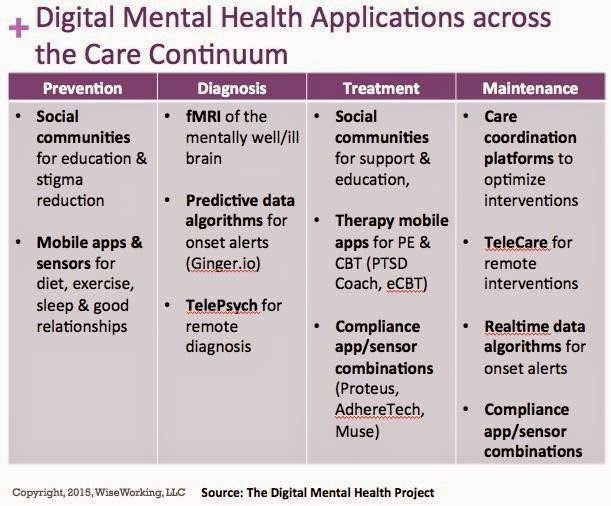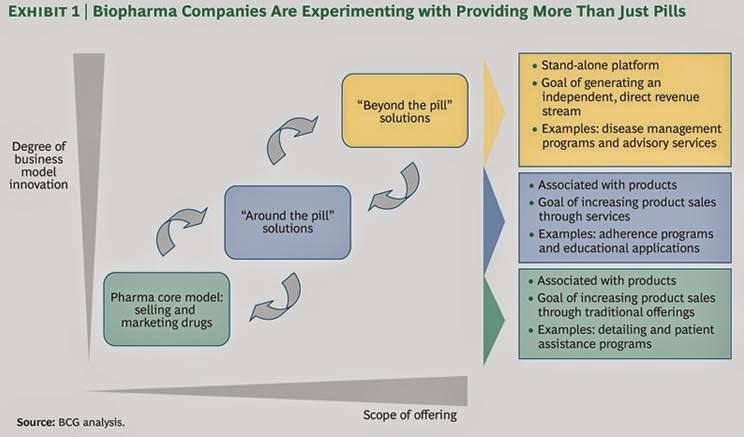Pharma’s Beyond the Pill Mental Health Opportunity
Recently, a shift has started to occur in the healthcare and technology industries known as “digital health.” Digital health as it’s commonly defined is “convergence of the digital and genetics revolutions with health and healthcare with the goal of reducing inefficiencies in healthcare delivery, improving access, reducing costs, increasing quality, and making medicine more personalized and precise.” Or more simply put, the “intersection of technology and healthcare to benefit patient care.”
Research efforts conducted by The Digital Mental Health Project are attempting to survey and identify the ways digital technologies are being used to address mental health. It has been encouraging to see the many opportunities that exist for the Pharmaceutical industry on this landscape.
What we mean by Beyond The Pill
Referencing a recent Boston Consulting Group article about customer expectations, slowing therapeutic innovation, and revenue loss in the Pharma industry, one may tend to think of the opportunities that support Pharma’s core pill volume business - something that has been harvested to the nth degree over the years. On second thought, one might consider a second type of opportunity known as “around the pill” opportunities which constitute various supportive adherence and assistance programs that enable the acquisition and compliant ingestion of medication. In this piece, we want to very briefly describe Pharma’s “beyond the pill” potential. In this case “beyond the pill” constitutes adjacent business models which generate revenue streams based on value, largely independent of the pharmacologic solutions that industry has been built on. Pills may be part of the solution but not the only solution.
Digital Mental Health’s Potential Beyond The Pill
When you look at digital’s potential in the mental health area you see its potential (maybe we can devise a table to illustrate this) spanning from:
prevention, via educational & stigma-reducing social communities & mobile apps and sensors which encourage the pillars of good mental health, diet, exercise, sleep and good relationships, to,
diagnosis via functional MRI which can witness physical differences in the mentally ill brain, predictive & continuously tracking data algorithms which can correlate factors like communications velocity, GPS mobility and heart rate to formulate relapse alerts, to,
treatment via supportive & educational social communities, mobile apps which administer therapies like prolonged exposure (PTSD Coach) and cognitive behavioral therapy (CBT), app/sensor combinations which train & reinforce compliance like the Proteus Digital ingestible and AdhereTech & GlowCap pill bottle which signals pills have been taken, and care coordination platforms which create more seamless care communications and tracking between the patient, caregiver, provider, payor, public health and penal systems who increasingly care for the mentally ill, to,
maintenance (recovery) via many of the technologies mentioned above.
 This range of applications would be beneficial for any pharmaceutical company with long-term commitments to the CNS space.
This range of applications would be beneficial for any pharmaceutical company with long-term commitments to the CNS space.
Pharma’s Repurposed Core Competencies
Successful pharmaceutical marketers and commercialization teams have expertise which would be valuable to the mental health space. This especially rings true if this expertise were applied to challenges beyond the developing the next blockbuster pill, or pharmacological solution. If applied correctly, Pharma could contribute to the acceleration of the development, adoption and regulation of the digital mental health space. Some expertise which come to mind include:
- clinical and marketing research design, execution and application,
- change management from multiple perspectives of advocacy, policy, public perception & behavior modification, etc., and
- complex project design and management related to logistics, technology and sales/marketing (think blockbuster launches).
The Pharma industry is very successfull in these areas, better than many other entities in the healthcare ecosystem, and Pharma has the results to show for it.
A reassignment of this expertise could help address mental health challenges like: 1) perception modification, 2) behavioral modification, 3) disjointed care system logistics & coordination, and 4) inadequate data and research insights regarding the treatment and maintenance of people with mental ilnesses.
Let’s assume that we are smart enough to devise the business models to capture the payors, providers & patients’ revenue that need these challenges addressed. Let’s also assume that revenue can be generated as much from providing the supportive expertise, investment and infrastructures which directly attack these challenges as from owning the business model outright.
The Pharmaceutical industry has an opportunity to play an important role in helping current care entities (HCPs, provider organizations, and the public health systems and penal health systems) to do what they to do better.
The mental health system has challenges which outstrip the potential of pharmacologicals. Pharma has core competencies with expanded application in this space, can generate new “Beyond The Pill” value that may be viable futures for our companies, investors, customers and stakeholders. This approach holds a promise of not only providing solutions which address disease but which further address systemic care gaps and deficiencies.
Possibilities & Barriers
This premise calls to mind recent statements from the like of Stan Woodland, CEO of CMI/Compas, and Zoe Dunn, Principal at HaleAdvisors, who have pondered what a pharma company might look like with healthcare services and research arms in addition to their pharma R&D arms.
Doing this will require: 1) executive leadership & middle management sponsorship, 2) collaboration with a broad number of mental health ecosystem players including the penal and public health systems, and 3) a cultivated patient-first approach to business model design.
At least two barriers to our getting here are what we could call redundancy (strategic fit) and profitability (business model) challenges. When thinking about mental health “Beyond The Pill”, we have to address the issue of what our best role is, ownership, support, etc. and profitability. We do not have an answer today but we know most every CNS firm is working on this at some level, and this is a call for we as leaders to continue to work to influence within our organizations and networks to negotiate our right role and new business models that allow us to migrate the current CNS value we provide into new “mental health” value.
What do you think? Please share your thoughts as we work to co-create the industry’s future in this space.
Read more about The Digital Mental Project.
Check out my “Beyond The Pill” Favorites.
(Originally published February 12, 2015 by authors Craig A.DeLarge, Digital Healthcare Strategist and Shana L. Washington, Neuroscience Brand Management Professional)

